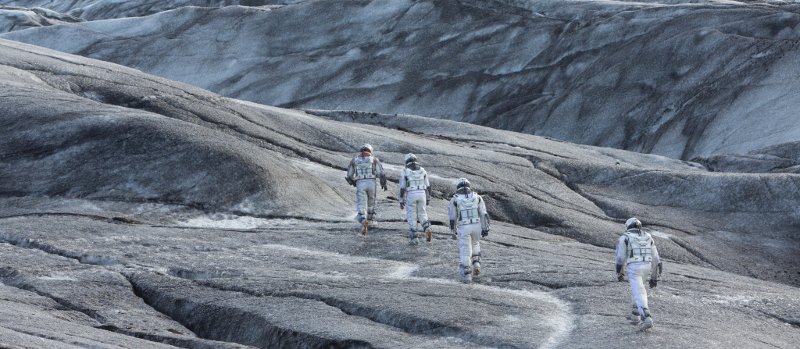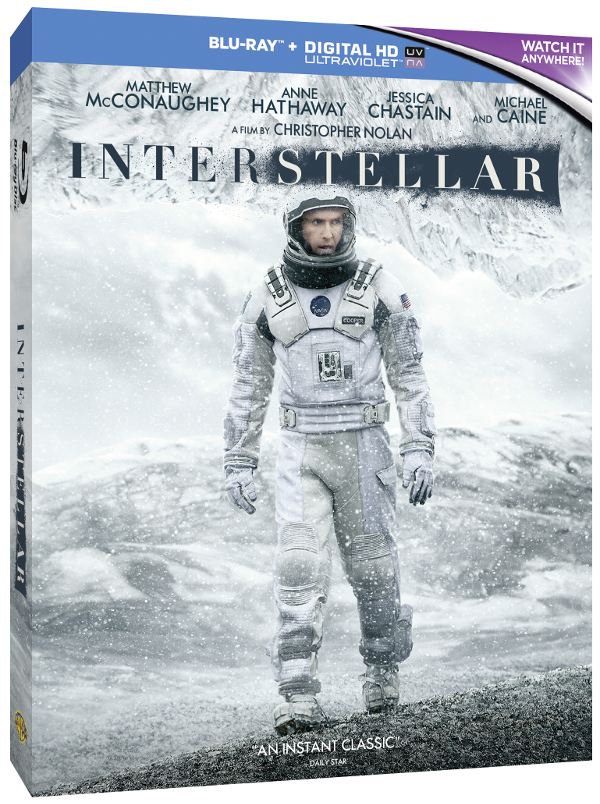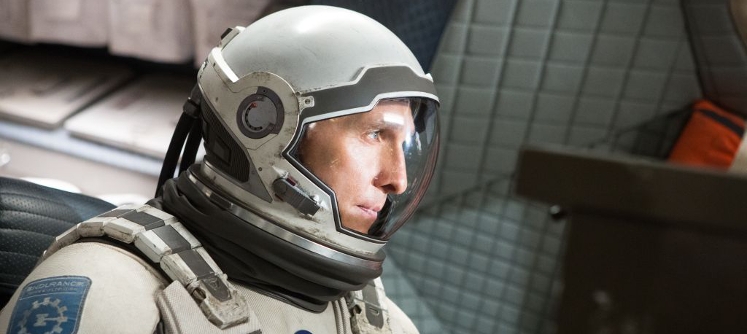Interstellar is convinced humanity will go out with a whimper, not a bang – but there is still hope for redemption in this sprawling yet intimate sci-fi epic.
Interstellar’s vision of humanity’s future is frightening because of how gradual and inevitable Earth’s demise seems to be. Food supplies and population levels are low and carbon levels in the atmosphere are rising. Torrential dust storms sweep across large stretches of farmland, causing massive increases in deadly bronchial disorders.
There are no roaming cannibals or gangs as you’ll find in The Road or Mad Max; just a persistent feeling of quiet desperation that mounts as Earth becomes more inhospitable, the figurative doomsday clock ticking towards midnight.
Among the stars
Matthew McConaughey plays an ex-NASA spacecraft pilot and engineer named Cooper. Cooper lives with his family on a farm in a nondescript part of the USA. The local school informs Cooper that his 10-year old daughter Murph cannot grow up to be an engineer because of the need for more farmers, despite being highly intelligent and curious about life well beyond her means.
The world is suffocating and humbling, but there is hope to be found. A mysterious ghost-like presence appears to be communicating with Murph via the manipulation of gravity, leaving a set of coordinates in binary from the dust on her bedroom floor. This leads Cooper and Murph to NASA’s classified compound, helmed by the aging but brilliant Professor Brand (Michael Caine). Brand is like a fictional counterpart of Elon Musk, convinced that humanity’s future lies among the stars.
What’s more, some benevolent force in the universe is making it all the more possible, having opened a wormhole on Saturn’s periphery. NASA sends twelve pilots through the wormhole, each emerging various points in the universe. Only three send out beacons indicating potential for a new habitat for humanity and Cooper is assigned to a small crew with one mission: to rendezvous at the beacons’ points of origin and return the pilots and their data safely to Earth.

The plot takes all manner of twists and turns, but Interstellar’s story is best discovered first-hand. The tension is highly-strung throughout, as almost every victory is quickly revealed to be another mistake that further diminishes humanity’s chances. The fate of mankind rests with the small crew and their semi-sentient computer drone, TARS.
Interstellar is never predictable and every time you think it might fall back into established sci-fi territory, it completely skews expectations; focusing on the crew’s personal turmoil and the dire situation back on Earth, as opposed to the blockbuster action and special effects.
However, you can’t understate the film’s visuals either. Space is represented in all its vastness and beauty, yet the sense of isolation and claustrophobia never lets up, particularly as many of these views are seen from the cockpit view of Cooper’s crew. Watching Earth slowly become a dot surrounded by blackness is just as revealing as a dimension-bending voyage through the wormhole.
The alien worlds that the crew land on are a sight to behold purely due to their relative bleakness. It’s a poignant moment when the crew realises that they will never settle anywhere that comes close to the beauty and diversity of Earth; but humanity must survive regardless, no matter what the cost!
The power of love
The hopelessness finally manages to find resolution with that most enduring of phenomena: the power of love (in addition to a few creative stretches of imagination; this is a sci-fi film after all!). Cooper’s father-daughter relationship with Murph is a theme that motivates his efforts and presents moral dilemmas between his duty to humanity’s future versus his “selfish” desire to save his family above all else. Such moral conflicts are rife throughout the film and leave plenty of room for thought. By the time the credits roll, don’t be surprised if you and your family just have to sit in silence for a minute as it all sinks in!
 Interstellar is more 2001: A Space Odyssey than Star Trek, but director Christopher Nolan takes his latest artistic voyage into brave new sci-fi thriller territory. The moral self-examination of The Dark Knight is met with the reality-bending of the human psyche that defined Inception.
Interstellar is more 2001: A Space Odyssey than Star Trek, but director Christopher Nolan takes his latest artistic voyage into brave new sci-fi thriller territory. The moral self-examination of The Dark Knight is met with the reality-bending of the human psyche that defined Inception.
If you can handle two hours of crushing and impending doom to reach the thankfully more uplifting payoff, then you’ll be rewarded with an emotionally draining but highly rewarding experience.
Interstellar is out now on DVD and Blu-ray.








